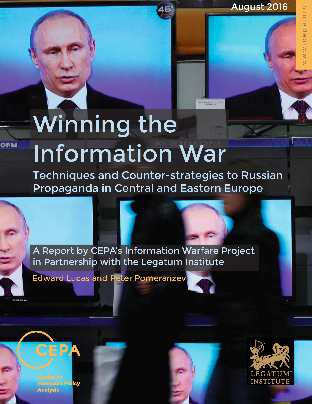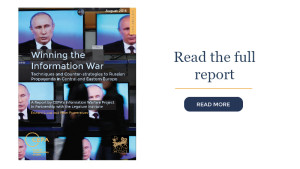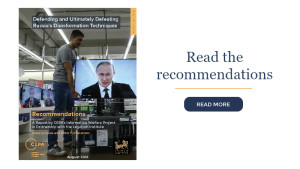BBG Watch Commentary
The Center for European Policy Analysis (CEPA), a transatlantic think tank based in Washington and Warsaw, has published in partnership with the Legatum Institute a major study titled, “Winning the Information War: Techniques and Counter-strategies to Russian Propaganda in Central and Eastern Europe,” written by two preeminent experts at CEPA on Russian propaganda and disinformation, Edward Lucas, a senior editor at the leading London-based global newsweekly, The Economist, where he covers covers cybersecurity, and Peter Pomerantsev, who leads the Beyond Propaganda programme within the Legatum Institute’s Transitions Forum. Both experts are published authors on Russia and propaganda topics and both have testified before committees of the U.S. Congress.
What from our perspective is most striking about the “Winning the Information War” study, both in terms of its excellent analysis and excellent recommendations, is the total absence of any significant references to the role of the $777 million (FY 2017) U.S. Broadcasting Board of Governors (BBG) U.S. federal information agency and its two major media outlets focusing on Russia: Radio Free Europe/Radio Liberty (RFE/RL) and the Voice of America (VOA). We found only one short footnote reference to a Radio Liberty Ukrainian broadcast, but there is nothing in the study on the objectives, programs, and possible contributions of the BBG, RFE/RL, or VOA.
During the Cold War, such a study would have probably been written by experts employed by RFE/RL. If it were written by somebody else, it would most certainly be full of references to U.S. international broadcasting to the region and would quote RFE/RL and/or VOA and United States Information Agency (USIA) specialists. Lucas and Pomerantsev obviously did not think about the BBG in writing their study. One wonders why.
These, apparently, are the days when such a major study on Russian propaganda can be written without a single mention of the Broadcasting Board of Governors, or at least a quote from someone in the agency. The Broadcasting Board of Governors under the current BBG Chairman Jeff Shell and BBG CEO John Lansing, both without any prior U.S. government, international affairs, public diplomacy or foreign policy experience, “is now less than an afterthought,” a former high-level presidential political appointee who wants to remain anonymous told BBG Watch.
Here is a short description of the “Winning the Information War” study taken from the CEPA website. We also include a link to the full report and a link to the CEPA report’s recommendations.
While there is no mention of the Broadcasting Board of Governors in the CEPA study, in their recommendations, the authors mention a bill co-sponsored by Senators Chris Murphy and Rob Portman which calls for the creation of an interagency “Center for Information Analysis and Response.”
“Do the threats posed by 21st century information warfare require new government institutions to manage them? In the United States, some are calling for the reconstruction of the US Information Agency, an institution abandoned after the end of the Cold War. A bill co-sponsored by Senators Chris Murphy and Rob Portman calls for the creation of an interagency “Center for Information Analysis and Response,” a smaller and more exible response. Such a center could analyze Russian information warfare efforts; establish a framework for the integration of critical data into national strategy; develop, plan and synchronize a response across di erent government bodies that would expose foreign information operations, and pro-actively advance fact-based narratives.”
###
CEPA
Winning the Information War
As revisionist, autocratic states like Russia sharpen their use—and abuse—of disinformation, liberal democracies are failing to keep pace. The Kremlin’s use of information as a weapon is not new, but its sophistication and intensity are increasing. Belatedly, the West has begun to realize that disinformation poses a serious threat to the United States and its European allies, primarily the “frontline states”—Poland, the Baltic states, the Czech Republic, Slovakia and Ukraine—but also to Western Europe and North America.
How has Russia’s pollution of the information space shaped international discourse on alliances, organizations, public institutions and mainstream media? What can be done to filter these digital toxins from our democratic system?
“Winning the Information War: Techniques and Counter-strategies to Russian Propaganda in Central and Eastern Europe” is the latest report from CEPA’s Information Warfare Initiative. Conducted in partnership with the Legatum Institute, it analyzes the impact of Russian disinformation by drawing on dozens of case studies, some directly commissioned by the authors and others detailed by on-the-ground monitors. Project chairs Edward Lucas and Peter Pomerantsev synthesize those works and analyze the tools of Russian information warfare—overt propaganda channels as well as the political forces, civil society actors, businesses and public figures who use them. The report also looks at several examples of policies Russia has enacted to spread disinformation throughout Central and Eastern Europe.
Winning the Information War concludes with a comprehensive set of recommendations— also produced as a stand-alone report—to defend against and ultimately defeat Russia’s disinformation machine.


